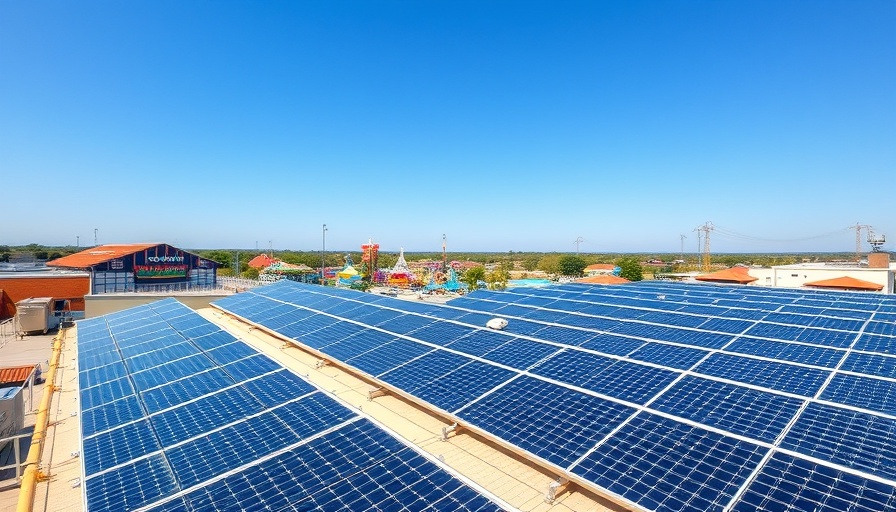
The Shift in EDP Renewables: Job Cuts and Market Strategy
In a strategic pivot towards developed markets, EDP Renewables, the world's fourth-largest provider of renewable energy, has announced job cuts at its Singapore headquarters. This restructuring is a significant move, as the company is evolving its operations to better align with the lucrative markets of Japan, Australia, and Taiwan.
While EDP initially aimed to expand its workforce from around 450 employees, the current shift indicates a realignment of resources. Reports suggest that approximately 44 employees have been let go in Singapore, primarily from finance and business development roles. The company emphasizes that despite these cuts, it anticipates maintaining a similar workforce by hiring in growth markets and relocating functions to Malaysia. This shift is important for the green energy sector, especially as it highlights the competitive landscape where companies must adapt to changing economic realities.
The Larger Ecosystem of Renewable Energy in Asia
EDP's restructuring comes at a critical time in the renewable energy industry in Asia. Countries like Indonesia and Vietnam are rapidly expanding their green energy initiatives. For instance, Equator Renewables Asia, a spin-off from EDP Renewables, has pledged a staggering $22 billion investment in Indonesia’s Green Economy Corridor aimed at constructing solar power plants. This aligns perfectly with EDP's goals to enhance its capacity in Asia, which already stands at 1.6 GW-peak, nearing its 2025 target of over 2 GW.
This growing emphasis on solar power underlines the general trend of investing in clean energy solutions across the region. As climate change continues to impact global dynamics, the focus on renewable resources becomes increasingly vital, not just for corporate sustainability, but also for ecological stewardship.
The Broader Impact of Job Cuts in Renewable Sectors
Job cuts in the renewable sector bring attention not only to the company but also to the overall economic health and job market within these industries. These decisions can often lead to uncertainty among employees and investors alike. EDP's decision, while perhaps financially prudent, raises questions about long-term job security in a field that is generally viewed as the future of energy.
However, as competition intensifies, it is essential for companies like EDP Renewables to focus on operational efficiency. The emerging investments into newer markets may very well create new opportunities, albeit in different geographic locations. For job seekers passionate about sustainability, this can be a double-edged sword—new opportunities can emerge in more developed markets, but jobs in transitional markets like Singapore may dwindle.
The Role of Sustainable Practices in Corporate Transition
In the context of these changes, understanding the role of sustainable practices in corporate transitions is crucial. EDP's focus on redirecting its workforce aligns with broader sustainability initiatives that advocate for responsible consumption and environmental stewardship. The shift also highlights the importance of creating a sustainable future through eco-friendly practices and renewable energy adoption.
As firms pivot towards greener technologies and sustainable solutions, they not only contribute to the fight against climate change but also promote a circular economy where resources are reused and waste is minimized. For consumers, fostering a green lifestyle is intertwined with supporting businesses that prioritize ethical sourcing and sustainability practices.
Looking Forward: What This Means for Sustainable Development
The evolving strategies of EDP Renewables reflect a larger trend within the renewable energy sector focused on adapting to global needs. With their commitment to sustainable development goals, organizations must balance the economic realities with the need to promote eco-friendly innovations. The recent changes in leadership roles and workforce composition illustrate both challenges and opportunities in the renewable energy space.
Stakeholders and communities should be aware and engaged with those changes, pushing for transparency and commitment to sustainable practices in their local areas. Understanding the realities of transitions within major firms can empower consumers and businesses alike to prioritize sustainability and environmental conservation in their choices.
As we look ahead, it is essential for the renewable energy sector to focus on maintaining a balance between growth and job security, while also committing to sustainable and ethical practices that support a healthier planet.
For eco-conscious readers, paying attention to how major corporations like EDP interact with sustainability initiatives is crucial. Their choices can influence the broader market trends that ultimately affect consumer habits and society's approach to climate action. Embracing alternative energy solutions, supporting green businesses, and promoting responsible consumption can contribute to a more sustainable future for all of us.
To stay informed and engaged in the conversation surrounding renewable energy and sustainability, consider joining community discussions and following developments in eco-friendly practices. Your voice matters in advocating for a cleaner, greener planet.
 Add Row
Add Row  Add
Add 



Write A Comment